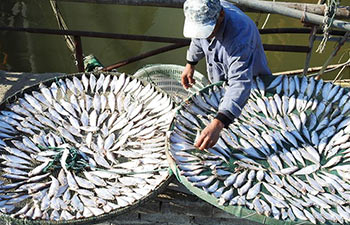HARBIN, Oct. 31 (Xinhua) -- For the first time in the past five years, scientists at China's National Avian Influenza Reference Laboratory were able to spend the week-long Chinese Lunar New Year holiday in February with their families.
Chen Hualan, director of the laboratory, led her team to this victory after a five-year battle against H7N9 bird flu viruses.
Chen, a member of the Chinese Academy of Sciences, is one of the top virologists in the world and is devoted to saving lives.
FIGHTING H7N9
In March 2013, Chinese public health authorities reported the first human cases of the disease due to an infection of a type A influenza virus strain H7N9. This strain of the virus usually only infects birds.
Chen's team rushed to the spot for an investigation into the origin of the virus. Within 48 hours of the first human cases being announced, her team found similar H7N9 flu viruses in the samples collected from a live poultry trading market in Shanghai.
Following Chen's advice, the authorities ordered the infected poultry market to be closed immediately, leading to an instant drop in human infections.
"The H7N9 viruses are nonpathogenic in poultry but could be pathogenic and even lethal for humans," Chen said.
The H7N9 viruses have caused five waves of human infection since 2013, among which the second to fifth waves started around the beginning of October each year.
The climbing number of deaths put a heavy weight on Chen. She and her team spent the past Chinese Lunar New Year holidays from 2014 to 2017 at the forefront of fighting bird flu.
"We had no reason to slack off when H7N9 was still looming," she said.
WORLD-CLASS RESEARCH
Chen's laboratory in the Harbin Veterinary Research Institute of the Chinese Academy of Agricultural Sciences has been a leader in H5 avian influenza vaccine development and application.
Since 2004, more than 230 billion doses of H5N1 vaccines developed by Chen's team have been used worldwide, serving as an alternative measure for many countries that once only resorted to stamping out poultry during avian influenza outbreaks.
In 2013, Chen and her team published important and systematic findings of H7N9 viruses in "Science," and the study was listed among China's top 10 scientific achievements in 2013.
Given Chen's contribution to the research and control of the H7N9 bird flu, she was selected as one of the "10 people who mattered in science" by the journal "Nature" in 2013.
World-class research findings are based on enormous efforts.
Chen's team conducted large-scale monitoring of bird flu viruses twice a year. They stepped into poultry farms and markets across the country and collected samples from live chickens' throats and cloacae.
In 2017 alone, they collected 53,000 samples. The samples were soon brought to the laboratory for virus isolation and analysis.
"Viruses do not sleep. They are constantly mutating. A small mutation could trigger new risks," Chen said. "We cannot let down our guard."
HARD-WON SUCCESS
The fifth H7N9 bird flu outbreak lasted from October 2016 to September 2017, infecting 766 people.
Chen's biggest worry finally arrived when they found that a mutation in H7N9 virus made the virus pathogenic and lethal to chickens. "It posed an increased threat to humans, bringing the fatality rate to over 50 percent."
From January to September 2017, Chen's race with the virus came into the home stretch.
Her team intensified sample collection and monitoring and accelerated virus analysis and vaccine development.
Their efforts paid off. A new bivalent H5+H7 vaccine was developed, and the application was initiated in September 2017.
Data showed that the vaccine effectively prevented the spread of H7N9 bird flu viruses in poultry and successfully eliminated the H7N9 virus infection in humans.
Bird flu has seldom been heard of in 2018, but Chen remained busy as usual. "We will not relax until bird flu viruses are completely rooted out."
Thanks to Chinese researchers like Chen, China has made huge progress in the bird flu field over the past four decades of reform and opening up.
For Chen, she felt it worth to let her work occupy a large part of her life.
"Is there anything funnier and more deserving for me than to nip a bird flu pandemic in the bud?" She said.

















